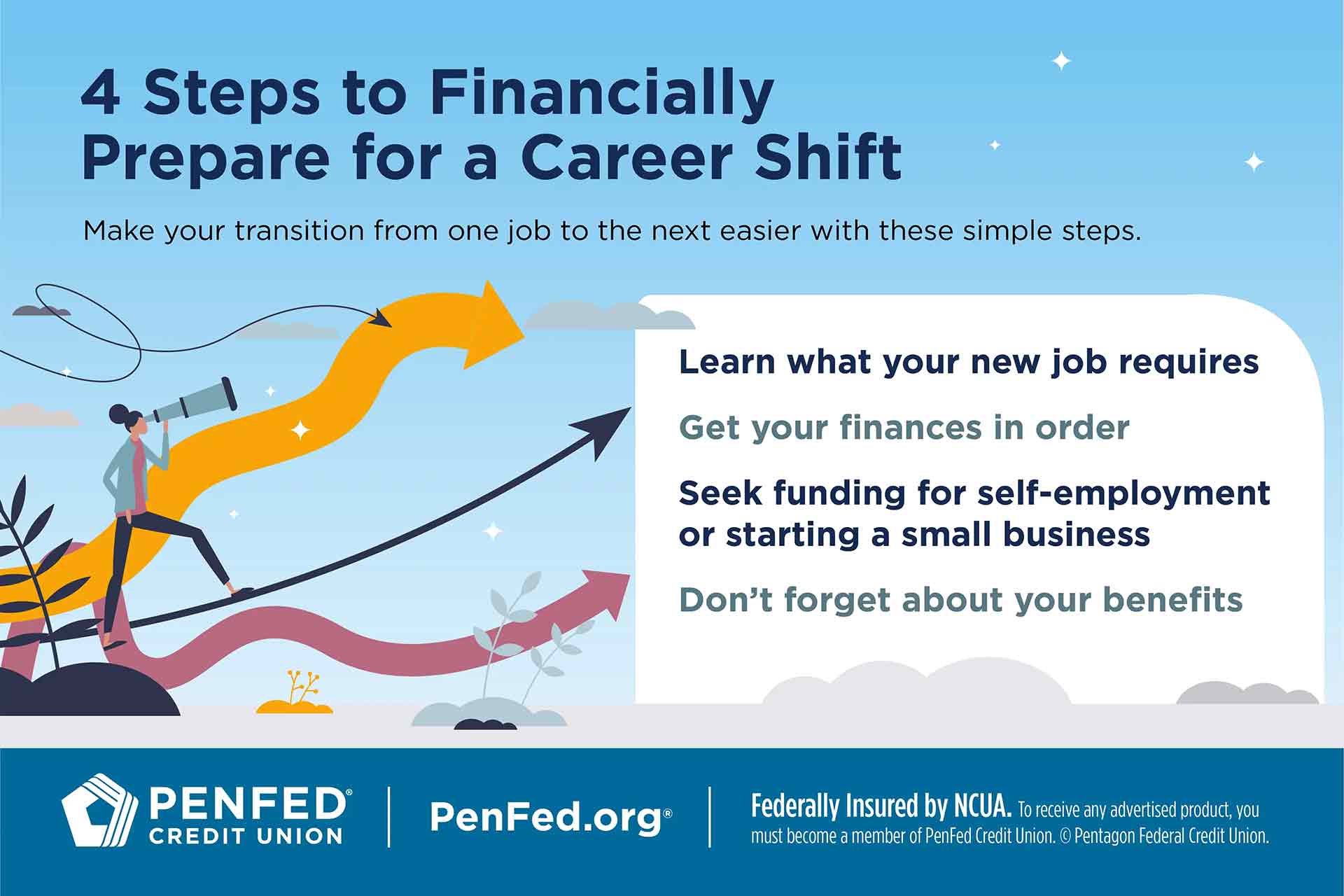Finance
How to Financially Prepare for a Career Shift
EXPECTED READ TIME:8 minutes
Between the ages of 18 and 24, the average person changes jobs 5.7 times. That number drops as people get older, with people ages 35 to 44 changing jobs only 2.4 times on average. But regardless of age, changing jobs isn’t uncommon.
The key to a successful career transition is to financially prepare. That means a little research, a little budgeting, and a lot of peace of mind. Here’s how to do it.

Do Some Career Hygiene and Planning
Once you set your heart on your new career path, it’s tempting to hand in your notice and hit the exit. But that’s not the best approach in most cases. Changing careers can take time and money, so you’ll need to rely on your current position while you prepare for the change. Here are ways you can prepare for your new job before quitting your current one.
Changing careers can take time and money, so you’ll need to rely on your current position.
Do Your Homework
What does your new dream job pay? What kind of benefits does it usually come with?
Use the power of the internet — and specifically websites like the U.S. Bureau of Labor Statistics and other job search websites to learn more about your new job. As well as the questions above, you’ll want to know whether:
The long-term growth outlook for the job is increasing (or at least steady)
You need to earn a degree or certification to qualify for the job
You’ll have to pay for any training or if that’s available for free
In many cases you’ll have to learn new things to get your foot in the door.
Find Ways to Upskill
You may already have the skills for your new job, but in many cases you’ll have to learn new things to get your foot in the door. You can do that by:
Taking online courses
Completing online certifications
Finishing a degree or certification program at a college, university, or technical school
You can also take advantage of opportunities with your current employer, which could save you a lot of money. If your new job is in the same field as your current position, you may be able to:
Take on additional tasks at work to learn new skills
Partner with coworkers on projects that broaden your skills
Talk to your manager about any training programs or financial aid your employer provides for employee development
In many cases you’ll have to learn new things to get your foot in the door.
Look for Part-Time or Volunteer Opportunities
Employers are more likely to hire someone who has real-world experience. Even if you have a degree or have taught yourself the skills you need for your new job, many employers want to see evidence of those skills in action. You can start building work history for your new job through:
Volunteer work that showcases what you know
Freelance work (be sure to document this in a portfolio you can share)
Taking a part-time job in your new field
Employers are more likely to hire someone who has real-world experience.
Use Your Leave Wisely
If money will be tight while you change jobs, you might want to save and cash out your leave when you hand in your final notice. This will give you extra funds on your final paycheck to help with any transition costs.
Get Your Finances in Order
A steady paycheck helps you create a set-it-and-forget-it foundation for everyday expenses. Changing jobs can destabilize that rhythm and mess with your budget, at least temporarily.
That’s why it’s important to financially prepare before a career transition. Good preparation will help you avoid turning to credit cards, dipping into your nest egg, or draining your retirement savings. It will also minimize stress so you can focus on your new career path instead making ends meet.
You might want to save and cash out your leave when you hand in your final notice.
Update (or Create) a Budget
Review your budget and make sure everything’s up to date. Know how much money you have coming in, how much you have going out, and which expenses are essential versus non-essential.
If you don’t have a budget, we can help you build one in 6 steps. Having a budget will help you make better choices about saving, spending, and investing your money whether you’re changing jobs or not.
Plan a Future Budget
Your salary and benefits will change when you transition jobs, so you need to think about what your future budget will look like. Using your online research, determine:
Whether your future job will support your current lifestyle, or whether you’ll need to change how you spend
Whether you’ll have any additional expenses (such as higher taxes, more expensive health insurance, or out-of-pocket costs you’ll be reimbursed for)
Also consider whether you’ll have costs associated with taking a new job. For instance, will you:
Be commuting farther or paying for parking
Need a different wardrobe for your new work environment
Need to provide your own tools or equipment
Have to move
Debt does make you more vulnerable during periods of transition.
Make a Debt Reduction Plan
With mortgages, cars, credit cards, and student loans, it’s hard not to have some debt. While that’s not necessarily a bad thing (as long as you stay on top of it), debt does make you more vulnerable during periods of transition.
If possible, create a plan for paying off your debt (or paying it down substantially) before changing jobs. There are many ways to pay off credit card debt, from debt consolidation to balance transfers. If you’re carrying student loans, you have options like refinancing your loans or working with your loan servicer to reduce your monthly payments.
Create a plan for paying down your debt before changing jobs.
Check Your Savings
Your savings account will be your best friend if you experience gaps in pay or unexpected expenses while changing careers. If you don’t have enough saved, you can always liquidate assets to give yourself more ready cash, or you can set a savings goal.
Set a Savings Goal and Build a Savings Strategy
If you don’t have enough in savings to change jobs, you can figure out how much money you’ll need and set a savings goal. Once you hit that goal, you can jump jobs.
A high-yield savings account (such as PenFed’s Premium Online Savings) that offers a higher APY is a great option. Certificate investments offer a guaranteed return at an even higher rate than most savings accounts. And with the right certificate investment strategy, you could boost your savings quickly and accelerate your career change.
Preserve Your Retirement Savings
It can be a tempting way to fund a current career shift, but tapping into retirement savings is not a good idea for most people. You may end up paying taxes or penalties on what you withdraw.
“Making up” retirement savings is also incredibly difficult because of the way compound interest works. While you may put back the $2,000 you withdrew, you’ll still have missed out on the interest on that sum, which over time could be worth thousands more.
Tapping into retirement savings is not a good idea for most people.
Check Your Emergency Fund
An emergency fund is money set aside in case of large, unplanned, necessary expenses. You should only rely on it for emergencies such as job loss, medical expenses, or home or car repairs.
Before you quit your current job, make sure your emergency fund is healthy. You may end up making less than you’re used to for a period of time, or you may have a long job search before you find the right position. Facing an emergency during that vulnerable time could set you back if you’re not financially prepared.
Seek Funding for Self-Employment or a Small Business
Maybe your new dream job involves working for yourself. Whether that means a business of one or starting a small empire, you’ll incur setup costs. You can cut some of those costs by applying for grants and connecting with free opportunities in your community.
Before you quit your current job, make sure your emergency fund is healthy.
Look for support at both the state and federal level. In addition to support through the U.S. Small Business Administration, you’ll also find networking and funding opportunities through local small business development centers. Many universities also host small business incubators where you can find free or low-cost help starting and growing your small business. From budgeting to marketing, they have research and experience to assist you every step of the way.
Don’t Forget About Benefits
Compensation from your employer doesn’t just mean the money in your paycheck. Today, employers offer a range of additional benefits that make up your compensation package. You’ll want to have a game plan for replacing any benefits that will cease when you end your employment.
Compensation from your employer doesn’t just mean the money in your paycheck.
1. Figure Out Your Health Insurance
If you get health insurance through your employer, you’ll need to consider alternatives in case you have a gap in coverage. Some options include:
Getting coverage through your spouse
Finding coverage through the health care marketplace
Using COBRA coverage for a short gap period between your old and new insurance
Using medical discount plans
These options vary in price, and some may be too expensive for you. Start considering options early so you can include them in your transition budget.
Check with HR and payroll to ensure you’re getting everything you’re owed.
2. Check for Additional Owed Funds
Before you head out the door one last time, check with HR and payroll to ensure you’re getting everything you’re owed:
Do you know how much unused PTO you’ll be paid for?
Do you have any unpaid commissions?
Have you been reimbursed for all travel and out-of-pocket expenses?
Ask about vesting requirements, too, so you understand any stock options or retirement match benefits you’ve received as part of your compensation. In some cases, you may have to have worked for an organization a certain number of years to keep these benefits when you leave.
3. Plan for Expenses You Now Have to Cover
Do you take advantage of your office’s fully stocked snack bar? Is your lunch paid for every Friday? Has yoga become an essential part of your life since you finally started using your company-provided gym membership?
Are you sure you want to leave?
All jokes aside, you need to think about how perks impact your day-to-day and how you’ll cope with losing them. Maybe you’ll choose to do yoga at home and make your own snacks — or you may need to make a line item in your budget so you can continue going to the gym. It’s down to what you value and what your budget can handle.
The Takeaway
Transitioning careers can be daunting. But with research and careful planning, you can make the transition smoothly — and without depleting your savings. All that’s left is to focus on the world of opportunities your new job will open up.
Find a Certificate That Matures at the Same Rate as Your Dream
Discover the diverse offering of products, services, and support available to our members.




